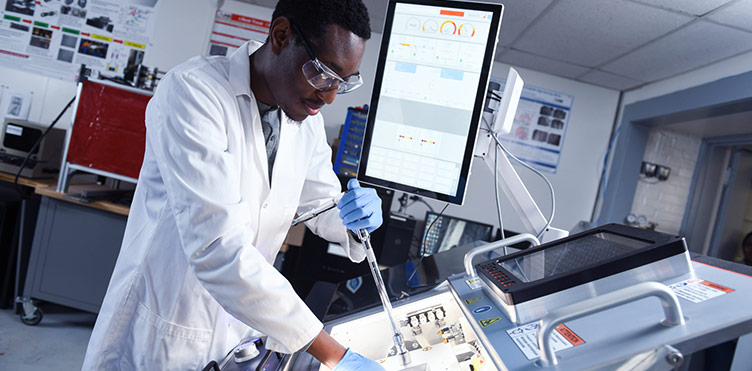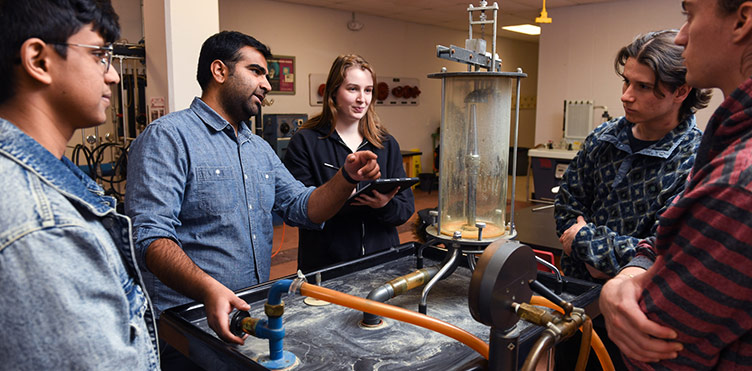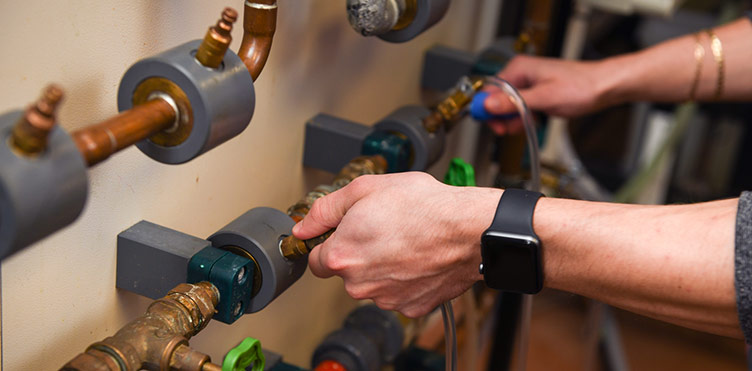Graduate programs

Get into the flow of things
A UNB Engineering graduate degree in mechanical engineering (ME) is an excellent way to concentrate on the knowledge needed to solve wide-ranging and complex problems. Step into one of our outstanding research facilities to focus on what interests you.
UNB Engineering is numbered among the top 20 per cent of engineering faculties worldwide by the Times Higher Education rankings. We offer:
- leading expert researchers to guide your work
- the technical knowledge to become a leading innovator
- a campus nestled in the city of Fredericton in New Brunswick
- the ability to know your professors and fellow students
- the promise that you will never be just a number or a face in the crowd
Faculty research and research centres support our graduate programs. Work with pioneering faculty members always searching for better materials and processes to enable a healthier, safer and more prosperous world.

Specialized research
- acoustics and vibrations
- intelligent process controls
- advanced manufacturing and materials processing
- biofuels and biomass processing
- biomedical, biomechanics, ergonomics
- bioenergy and bioproducts
- composites
- high-performance machining
- laser machining micro/nano processing
- material characterization
- multi-scale modeling in solid and fluid mechanics
- mechatronics and design
- nanocomposites and mechanics
- renewable and alternative energy systems
- robotics, design and applied mechanics
- smart sensors and actuators
- solid mechanics
- thermofluids and aerodynamics
High-level research and development
Get access to labs, research groups and institutes.
Advanced Manufacturing Laboratory
Bioenergy and Bioproducts Research Laboratory
Institute of Biomedical Engineering (IBME)
Cutting-edge, multidisciplinary research into the field of biomedical engineering.
Marine Additive Manufacturing Centre of Excellence (MAMCE)
This is the first research centre in Canada to use 3D metal printing to manufacture certified, custom parts for the marine sector.
Nanocomposites and Mechanics (NCM)
NCM focuses on the development and integration of high-strength, lightweight materials, and surface-protective, nano-scale, material-activated technology solutions and seeks to prevent material failures.
The lab includes work in nanostructured (composite) particle design and synthesis, cold spray additive manufacturing (CSAM) of coatings and 3D architectures, and research into biocomposites.
Robotics and Mechanism Lab
Our people do outstanding research
- Dr. Muhammad Afzal develops novel technologies to produce renewable fuels to promote next generation clean energy
- Dr. Clodualdo Aranas designs and develops next generation and energy efficient advanced high-strength materials
- Dr. Hamed Asgari focuses on metal additive manufacturing and the behaviour of metallic materials
- Dr. Juan Antonio Carretero investigates robot kinematics and computer simulation of mechanical systems
- Dr. Rickey Dubay explores self-learning and advanced control of complex systems
- Dr. Nan Gao researches measurement science and technologies
- Dr. Phil Garland buzzes along with vibration and solid mechanics as well as piezoelectricity
- Dr. Andrew Gerber gets into the flow with fluid dynamics, thermodynamics and multiphase flows
- Dr. Joseph Hall investigates turbulence, vibration, noise and energy systems
- Dr. Tiger Jeans dives deep into submarine hydrodynamics, vortical flows and fluid dynamics
- Dr. Donald Lyon explores automatic control and rotating machinery
- Dr. Mohsen Mohammadi works on additive manufacturing and 3D composite printing
- Dr. Gobinda Saha researches composite, biocomposite, and nanostructured materials as the director for the NCM lab
- Dr. Andy Simoneau explores many aspects of manufacturing from materials to modeling, energy use, big data and sensor integration
Graduate programs in ME
MEng - Master of Engineering
Do you want to study at the advanced level in one or more areas of mechanical engineering but do not want to write a thesis? This degree will accelerate your career in industry and government sectors, and requires 10 courses for a total of 30 credit hours.
- 18 credit hours of technical courses
- 6 credit hours from a list of MBA courses
- 6 credit hours of whatever interests you
MScE - Master of Science in Engineering
Are you keen to dig into a topic through research? The course load for the MScE is only four courses for a minimum of 12 credit hours. The thesis is based on your research and is normally completed within two years. Note that you will need a thesis supervisor.
PhD - Doctor of Philosophy
Ready to contribute to new knowledge in the field? To be accepted into the PhD program you must have a master's degree from a recognized university or the equivalent. If you are already a master's student doing outstanding work, you may be permitted to transfer to the PhD program prior to completion of the master's program.
The course load of the PhD is four courses for a minimum of 12 credit hours. The rest is a thesis based on your research. Explore the faculty and their research to find a supervisor for your work.
MTME - Master of Technology, Management and Entrepreneurship
The MTME program equips you to start and manage a successful technology-based venture. Find your passion, generate ideas and launch a business.
Quick facts
- Degrees offered: MEng, MScE, PhD, MTME
- Application deadline: Open (MScE and PhD), March 1 and July 1 (MEng)
- Study options: Course-based and thesis-based
- Duration: Up to 24 months for the MEng; two years for the MScE; four years for the PhD.
- Entry terms: September, January and May
- Entrance to the MEng program is in the fall and winter terms only. Applications for fall entry are due by March 1, and by July 1 for the winter term entry.
You can also do co-op work terms to enhance your professional credentials and accelerate your career.

What it takes to join us
- Contact a faculty member and express interest in them as your supervisor before applying if you intend to do research and write a thesis.
- Check that you qualify with an undergraduate degree and a minimum Canadian GPA of 3.0 (B) average for course-based or 3.0 (B) for research-based degrees.
- Start in our Master's program or confirm you qualify as a PhD student with a Master's degree from an accredited university.
- Present a complete application with references and a one-page statement describing your research interests.
- If you are an international applicant whose first language is not English, submit language scores (minimum IELTS Band 7.0)
Contact the ME office for more information
Dr. Rickey Dubay, Director of Graduate Studies
Ann Bye, Graduate Secretary
Phone: 506.453.4513
